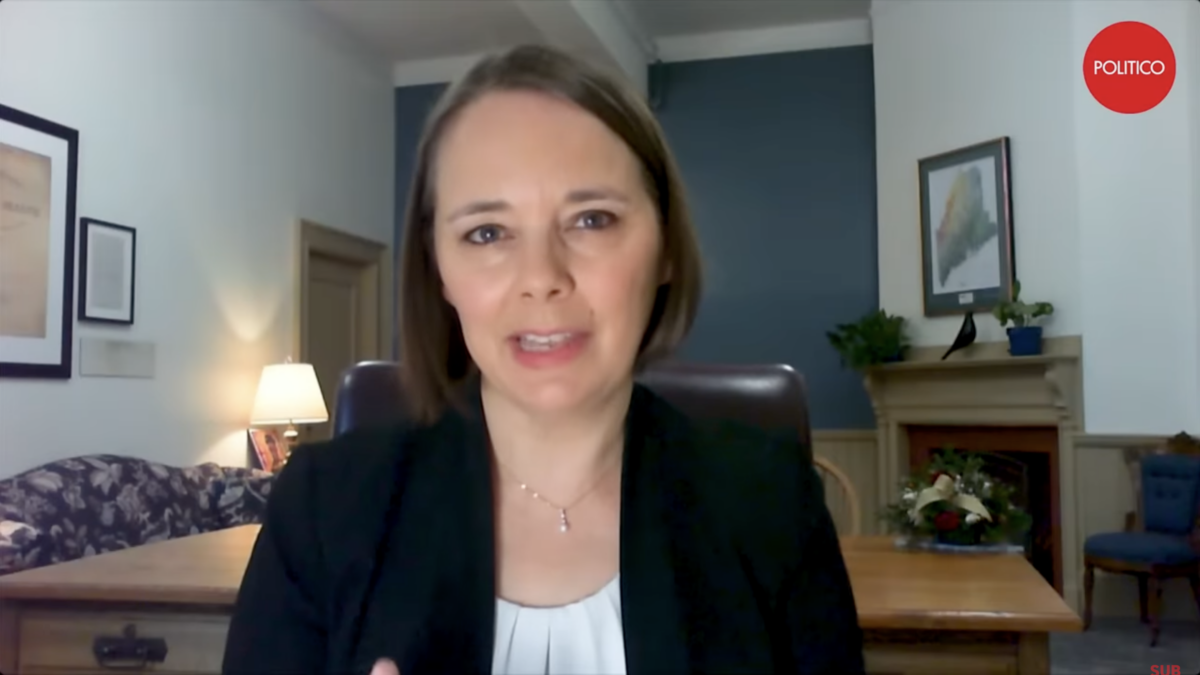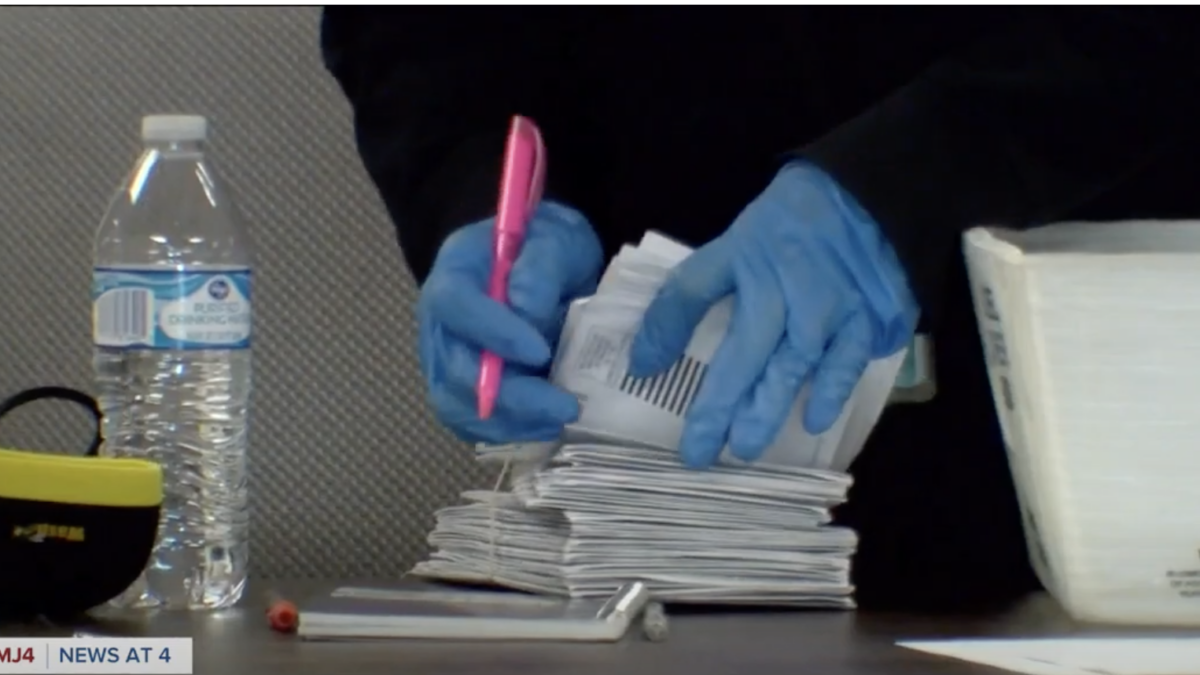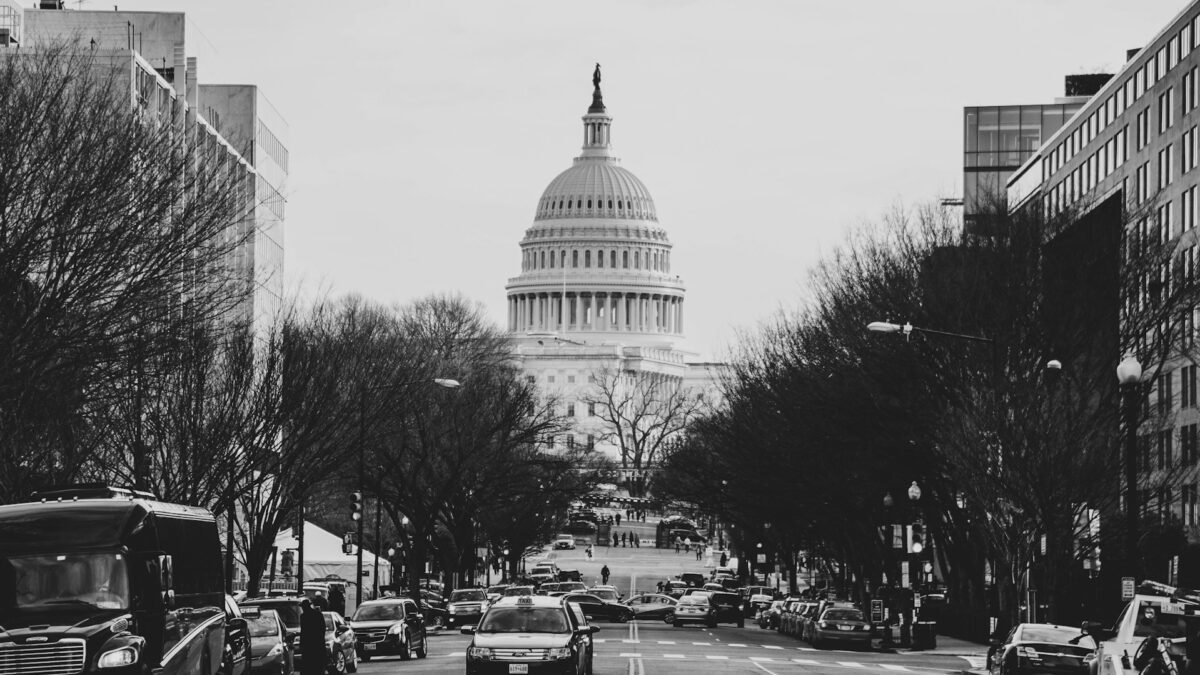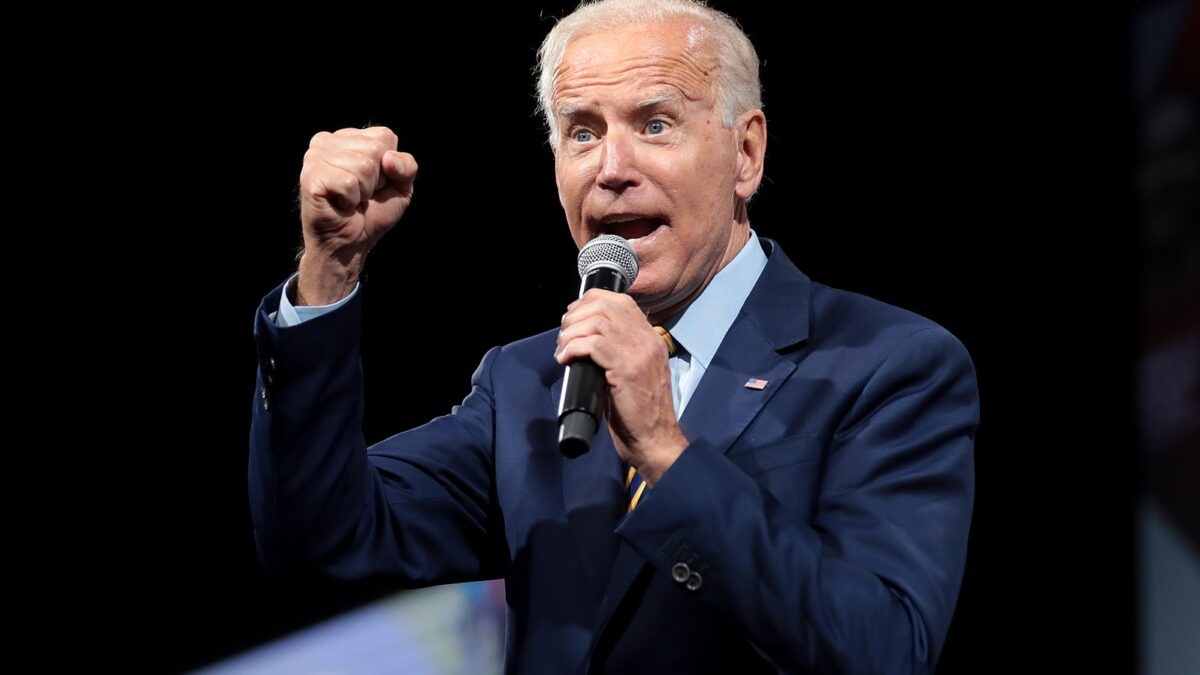The Democrat secretary of state who unilaterally decided to boot former President Donald Trump off Maine’s GOP presidential primary ballot is the poster child for the failures of ranked-choice voting (RCV) — and the perils to the republic RCV presents.
Shenna Bellows, a Trump-hating former ACLU lawyer, appeared to brag on video about how she employed the principles of the preference list scheme during her successful 2020 bid for secretary of state. In elections that employ ranked-choice voting, called “rigged-choice voting” by critics, voters rank candidates by preference so that, if no candidate wins a majority of votes, the loser is eliminated and has his votes reallocated to each voter’s second-choice candidate. The process continues until one candidate has a majority of votes, even if that candidate received fewer “first-choice” votes than others.
Bellows explains in the video, obtained by The Maine Wire, that “the position of secretary of state opened up in 2020, and I really wanted to run.”
In the clip, Bellows says she lobbied colleagues in the Democrat-controlled legislature to at least consider her for their second choice when voting on candidates for the position.
In Maine, the “secretary of state is elected by the legislature, so I was calling my colleagues in the legislature and asking for their votes,” she said. “Many of them had already made pledges to other candidates. But Maine has ranked-choice voting so I did a lot of, ‘OK, that person’s really great but can I be your No. 2 choice?’”
The Portland Press Herald noted at the time that “The 100 Democrats voting used a ranked-choice process to decide between five candidates [who to nominate], and Bellows advanced after four rounds of ballot tabulation.”
“I’m definitely sure I had more No. 2 votes than anybody else,” Bellows added, chuckling. “And, you know, end of the story, I became Maine’s first female secretary of state.”
It was far from the end of the story.
‘Mind-Boggling and Comical’
Bellows, a political climber, grabbed headlines late last month when she unilaterally decided that the left’s Public Enemy No. 1 was not qualified to be on the ballot. Bellows parroted Democrats’ leading talking point in declaring that Trump “engaged in insurrection” leading up to and during the Jan. 6, 2021 riot at the Capitol. Trump, the leading contender for the GOP presidential nomination, has been convicted of no such crime.
That fact apparently means nothing to the highly partisan secretary of state, who in 2021 tweeted her disappointment that Trump had been acquitted in a second impeachment trial.
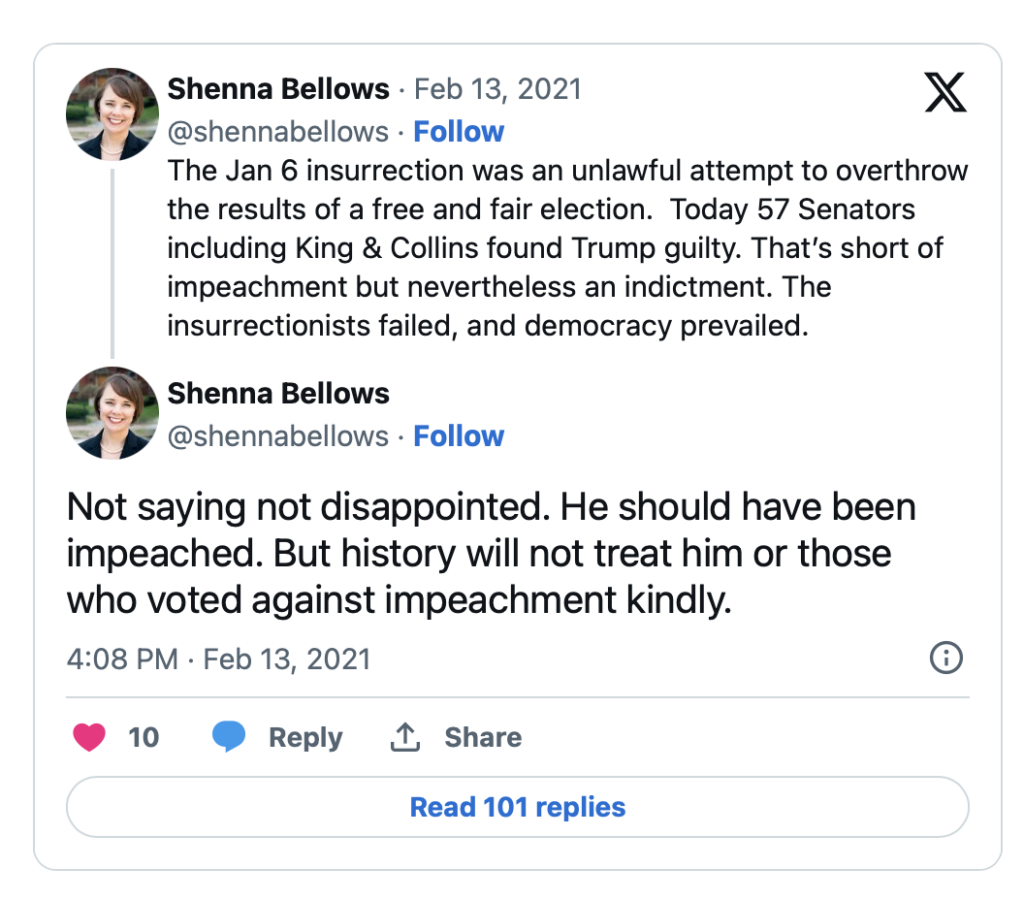
Trump has appealed Bellows’ unprecedented action in Kennebec County Superior Court, arguing the rogue secretary had no authority under Maine law “to consider the federal constitutional issues presented.” Trump’s attorneys also accused Bellows of making “multiple errors of law.”
As Newsweek reported, legal experts contend Bellows stands on shaky legal ground. Brett Tolman, a former U.S. attorney and executive director of Right on Crime, blasted Bellows’ decision in a post on X, calling the decision “mind-boggling and comical.”
In taking a 14th Amendment clause that was designed to restrict former Confederates from holding office and twisting it to “get Trump,” the left turns a jaundiced eye away from a central tenet of the amendment: due process. The equal protection clause of the 14th Amendment demands that no state shall “deprive any person of life, liberty, or property, without due process of law; nor deny to any person within its jurisdiction the equal protection of the laws.” That includes former presidents.
The U.S. Supreme Court has agreed to hear Trump’s appeal on the issue arising out of a similar fight in Colorado.
A ‘Trojan Horse’
Madeline Malisa, a senior fellow at the Foundation for Government Accountability who previously served as chief legal counsel for former Maine Republican Gov. Paul LePage, said Shenna Bellows is a promoter, benefactor, and creature of the Pine Tree State’s disastrous ranked-choice voting scheme.
“I’m from Maine. I know the confusion of ranked-choice voting,” Malisa said.
An eye-opening report released last fall by the foundation shows how, as The Federalist’s Shawn Fleetwood put it, “Democrats use the complexities associated with RCV to diminish confidence in elections among U.S. voters.” RCV is gaining popularity among elected Democrats because, the report explains, “legislators have seen the system allow less popular Democrats [to] beat more popular Republicans in federal races in both Maine and Alaska.” Weak-kneed Republicans fending off primary challenges have also joined Democrats’ efforts.
Malisa said the campaign is being funded in large part by leftists who have watched ranked-choice voting elect their preferred candidates. For instance, the Committee for Ranked Choice Voting has collaborated with far-left election advocacy group FairVote to create a ranked-choice voting education project known as “FairVote Maine,” according to InfluenceWatch.
Malisa said the vast majority of the RCV bills proposed have only Democrats as authors and co-sponsors.
“This threat is emerging very fast. A record number — 74 bills — promoting RCV were filed last year,” the elections policy expert told The Federalist. “They’ve seen how effective it’s been in Maine and Alaska. It’s a Trojan horse. [Its proponents] say, ‘Hey. You don’t like Donald Trump? Elect someone more moderate through ranked-choice voting.”
In 2022, Alaska elected Democrat Mary Peltola in a special House election in the “first federal test” of the state’s “jungle” primary.
“Ranked-choice voting is a scam to rig elections,” Republican Arkansas Sen. Tom Cotton declared at the time, noting that “60% of Alaska voters voted for a Republican, but thanks to a convoluted process and ballot exhaustion—which disenfranchises voters—a Democrat ‘won.’”
Even when RCV doesn’t deliver victory to a less popular candidate, it can create delays that generally undermine voter confidence. In New York City in 2021, now-Mayor Eric Adams received the most first-choice votes in the Democrat primary, but he wasn’t declared the winner until after eight rounds of candidate culling. It took nearly a month before the results could be certified amid a messy counting process.
More than a dozen states use RCV in some local jurisdictions. Nevada voters will vote in November on a constitutional amendment that would allow ranked-choice voting in congressional and state elections. Other states are contemplating the same.
Five states have banned the voting scheme, according to the foundation, and several more states have seen proposals seeking to ban RCV. In some, competing measures are slamming against each other. In Wisconsin this week, a legislative committee has scheduled a hearing on a pro-RCV proposal, while the same Republican-led committee shrugged off a call by RCV opponents to take up a bill to ban the voting scheme in the Badger State.
For all the left’s rhetoric about threats to democracy, Malisa says ranked-choice voting actually is one. In the New York mayoral primary, nearly 140,000 ballots cast were thrown away, nearly 15 percent of the total, according to the Foundation for Government Accountability report.
“That is the problem. Trashed ballots are the biggest disenfranchisement of voters, period,” Malisa said.
And Bellows, Maine’s Trump-hating secretary of state, is a leading proponent of ranked-choice voting. Last year, she applauded committee defeat of a bill that would have repealed the controversial law.
“Mainers have shown over and over that they support the use of Ranked Choice Voting in our elections. They appreciate the ability to vote with their hearts, rather than their fears,” Bellows fatuously stated, seemingly comparing the most sacred cornerstone of a constitutional republic to a kind of People’s Choice Awards.
“We rank things every day to make our choices – what kind of cereal to buy at the grocery store, which movie to watch, or what hike to go on with our friends. It’s common sense that we be able to do that with our votes as well,” she said.
Meanwhile, Bellows believes she — and she alone — has the power to limit voters’ choices by kicking candidates she doesn’t like off the ballot.
